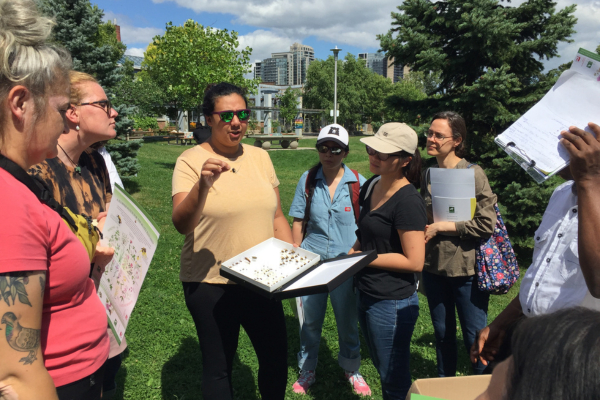Getting the buzz on climate resilient pollinator gardens: a UFDG workshop series
Submitted by Sarah Halonen on October 18, 2023
In the face of climate change, many of us wonder what actions we can take to combat its effects. The simple act of creating a native garden that puts biodiversity and pollinators first can bring us one step closer to a healthier and more climate resilient urban forest ecosystem.

Lorraine teaches us some practical identification skills to help us gain a better understanding of native plant species. © 2023 Sarah Halonen / LEAF
With the guidance of Lorraine Johnson and Sheila Colla, co-authors of A Garden for the Rusty-Patched Bumblebee, the garden stewards were reminded of the important role our Urban Forest Demonstration Gardens (UFDG) play in helping pollinators and combating climate change. These biodiverse native gardens work to support the natural relationships between co-evolved native species such as the cranesbill miner bee (Andrena distans) and wild geranium (Geranium maculatum), building a stronger web of connections that are essential in helping an ecosystem adapt to climate change. Our UFDGs are a natural climate solution!

There are over 800 species of native bees in Canada. Dr Sheila Colla introduces us to a few specimens from her collection. © 2023 Sarah Halonen / LEAF
Pollinators contribute greatly to the biodiversity in our urban forest, which in turn contributes to its resiliency. A central theme emerged throughout our workshop series: How can we as garden stewards best support pollinators through our native gardening practices and create resilient ecosystems?

Sheila shares the benefits of planting native goldenrods - more than 35 species of bees are specialist feeders on goldenrod pollen. © 2023 Sarah Halonen / LEAF
We encourage you to take on this simple climate action and grow a native garden for pollinators! Here are some strategies the garden stewards took away from their workshop experience:
- Focus on plant species native to your region (refer to A Garden for the Rusty-Patched Bumblebee for suggested species native to the Ontario and Great Lakes region)
- Don’t use pesticides! Instead, attract beneficial predatory bugs to your garden with native plants.
- Plant a variety of flowering species, ensuring blooms from spring to fall.
- Leave dead and hollow stems for cavity-nesting bees throughout the year.
- Include rotting logs and piles of sticks and brush in out of the way spots in your garden to provide nesting habitat and shelter for a wide variety of pollinators.
- Leave some bare ground for ground-nesting bees to create their subterranean tunnels.
- Embrace the mess! Avoid cleaning up dead leaves and standing plant stalks as these provide essential shelter and overwintering habitat and cover underground nesting chambers.
By applying these strategies, you can actively nurture a greener, more resilient future for our urban forest and the vital pollinators that call them home. And if you want to take part in supporting a LEAF garden, you can learn more about our UFDGs and how you can join our garden stewards team!
Sarah Halonen is the Stewardship Coordinator at LEAF.
Our Urban Forest Demonstration Gardens are supported by the Ontario Power Generation, Toronto Transit Commission and the City of Toronto through Live Green Toronto and the PollinateTO Grants Program.

0 Comments
Recommended Comments
There are no comments to display.
Create an account or sign in to comment
You need to be a member in order to leave a comment
Create an account
Sign up for a new account in our community. It's easy!
Register a new accountSign in
Already have an account? Sign in here.
Sign In Now